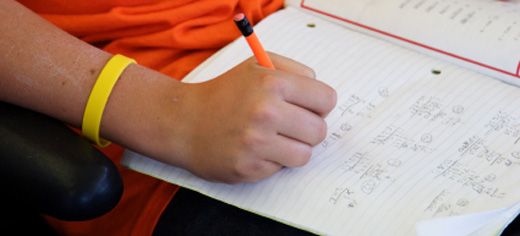Boys continue to outperform girls in maths, despite attempts to close the gap, according to a study from the University of Leeds and the University of Missouri.
Significantly, the gap is largest at the higher end of the academic scale; twice as many boys than girls are in the top 1% of maths students across the globe.
The findings also indicate that wide gaps in achievement between boys and girls in maths are common in more economically developed countries, where considerable efforts are typically being made to promote equality and encourage more girls to engage in STEM subjects (science, technology, engineering and maths).
The gap in achievement in maths in the UK is one of the widest in the world, along with countries such as the US, the Netherlands and Germany.
The study used data of 1.5 million 15 year olds across 75 countries, and examined the gap between boys’ and girls’ achievement levels in maths and reading from 2000 to 2009.
Co-author of the study, Dr Gijsbert Stoet from the University of Leeds, said: “The maths gender gap continues to exist, with boys continuing to outperform girls at all levels. But what is more striking is the extent of the gap at the top, between the brightest girls compared to the brightest boys. This is where we see the biggest gap in maths, despite recent reports that the gap is closing.
“Given it’s usually the highest performing students that are likely to go on to higher education or in to jobs in science and technology, this has huge implications for initiatives which have been designed to encourage girls into STEM fields and reduce gender discrimination. They seem ineffective, given this gap between boys and girls remains.”
The study comes at a time where there are calls in the UK to increase the number of students studying maths post 16. Recent findings from the Nuffield Foundation, a charitable trust funding research in education, has also identified performance and attitudes towards maths are important factors in determining whether or not young people continue with the subject.
Dr Stoet and co-author Dr David Geary from the University of Missouri are now calling for more understanding of how girls and boys learn maths.
Dr Geary said: “Efforts should be focused on improving the classroom experience to enable boys and girls to perform equally well, to encourage greater participation and interest in the subject. While some solutions might make a lot of sense at face value, like role models and gender empowerment, the research does simply not seem to support these proposed solutions.”
The study also reveals some other significant trends for policy makers to consider, as when it comes to performance in reading, girls continue to outperform boys and the gap is at its greatest at the lower end of the academic scale.
Commenting on these trends, Dr Stoet said: “The gender gap in reading gets less attention in the media than the gender gap in maths. Yet there was not a single country in which boys exceed girls in reading. And crucially, amongst boys and girls at the lower end of academic performance scale, the gap is not only greater, it is growing.
“What’s critical is that we have identified that there is a relationship between the maths gap and reading gap. In countries where the reading gap between boys and girls is small, we see a larger gap in maths, and vice versa. What this means is that it’s not just a question of focusing on closing the gaps in maths, as research shows there is a trade off between this and reading. There are obviously immense difficulties in closing both gaps, and this is something policy makers across the world need to address when considering intervention strategies and how best to allocate resources to improve performance and participation.”
The study is published today in PLOS ONE.
For further information
The study, “Sex differences in maths and reading achievement are inversely related: Within- and across-nation assessment of 10 years of PISA date” is available on request
Dr Gijsbert Stoet, University of Leeds (UK) is available for interview. g.stoet@leeds.ac.uk T: +44 78 77 507 206 or contact Rachel Barson, Press Officer, University of Leeds, T: +44 113 343 2060 or E: r.barson@leeds.ac.uk
